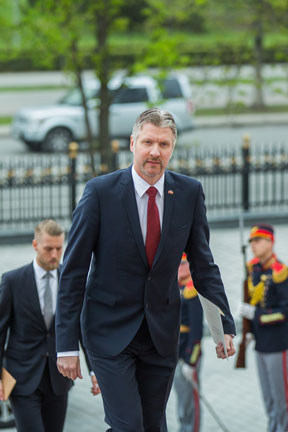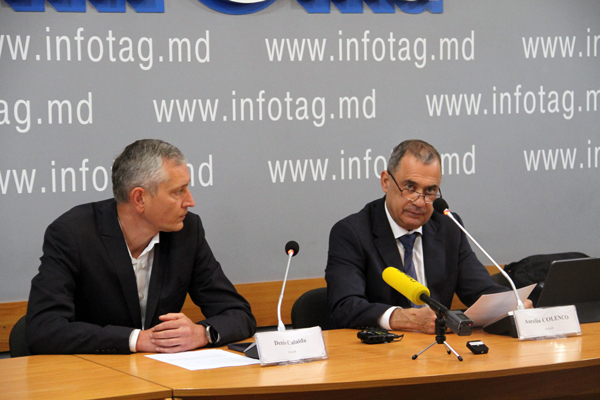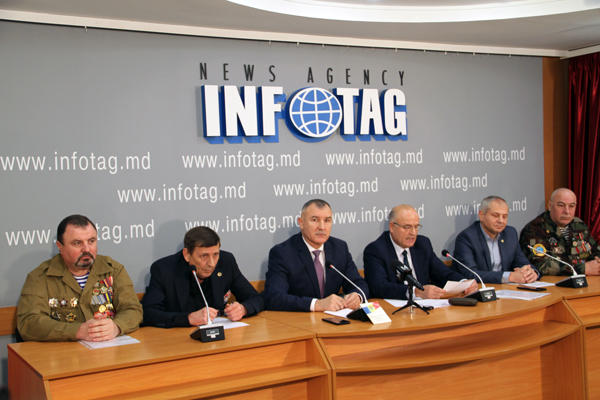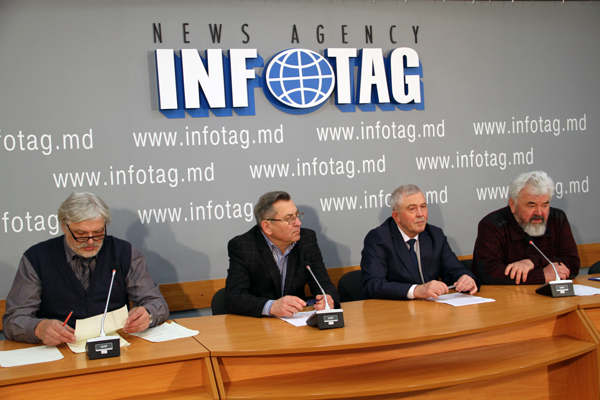Interview
ULDIS MIKUTS: "LATVIA SUPPORTS MOLDOVA ON THE EUROPEAN PATH"

Interview of Uldis Mikuts, Ambassador Extraordinary and Plenipotentiary of the Republic of Latvia to the Republic of Moldova, with the agency Infotag
“I.”: November 18 - Independence Day of the Republic of Latvia. How would you briefly characterize the independent path of development of Latvia, the main achievements of the Latvian people on this path?
Uldis Mikuts In short, it could be characterised with a Latin phrase “Per aspera ad astra” or “Through hardships to the stars”. On 18 November 1918 Latvian politicians came together for a ceremonial meeting in Riga to proclaim independent democratic Republic of Latvia. The idea of Latvia at that time meant the emergence of a new national identity which was rooted in much older sense of a common territory, language and culture, having traces back even to the 13 century. However, after proclamation of independence, Latvia had to fight in defence of its statehood for almost two years. Thereafter, Latvia began its development as a democratic republic until the Second World War, which was followed by occupation and soviet rule for almost 50 years in result of secret protocols of the agreement between Soviet Union and Nazi Germany, also known as Molotov-Ribentrop pact. Independence was restored through so-called awakening period of society and increased desire for statehood in the end of 80’s, culminating in the Declaration "On the Restoration of Independence of the Republic of Latvia", which was adopted on 4 May 1990. These historical stages have proven that Latvia’s history is a story of continuity where legacy of values and strive for freedom and democracy have constantly taken over external influences of foreign powers. That, in my view, is the biggest achievement of our nation so far.
“I.”: Latvia continuously supports Moldova on the way of its rapprochement with the European Union, providing multilateral assistance to Moldova in the process of implementing the Association Agreement of the Republic of Moldova - European Union. How do you assess Moldova's fulfillment of its obligations to implement the Association Agreement?
Uldis Mikuts: Latvia indeed always has supported and will continue to support Moldova’s efforts on the European path. We expect the government to actively continue full implementation of the Association Agreement with the European Union, with continuous commitment to implement reforms based on this Agreement. Reforming the judiciary, strengthening the rule of law, fighting corruption and shadow economy, ensuring media plurality, and working towards sustainable economic development should certainly be actions of priority. Robust progress in these areas remains essential. It is very important to ensure sustainability of these reforms for tangible benefit of society.
“I.”: Taking into account the Latvian experience of integration into the European Union, what “integration distance” has Moldova already covered?
Uldis Mikuts: There exists a strong political association and economic integration between European Union and Moldova on the basis of Association Agreement with its Deep and Comprehensive Free Trade Area. Association agreement in itself is, in principle, the most ambitious and most far-reaching type of agreements the EU can conclude with a third country. In case of Moldova, association agreement provides for comprehensive framework in relations with the EU. In short, association is certainly a deep and serious level of relationship between EU in Moldova.
“I.”: What should the Moldovan authorities pay more attention to in rapprochement with the European Union?
Uldis Mikuts: Implementation of reforms based on the Association Agreement and the Agreement on Deep and Comprehensive Free Trade Area is a key. It is very important to pursue association agenda to strengthen relations between EU in Moldova ever further. This is mutually beneficial since these are true long-term advantages for society that are put in forefront. We also believe that Moldova should take full advantage of the opportunities provided for by different EU instruments, such as Twinning, Erasmus, visa free travelling, participation in the EU missions and others.
“I.”: How do you characterize the level of relations between Moldova and Latvia?
Uldis Mikuts: Our two countries and nations enjoy very warm and pleasant relations and close cooperation. Latvia has always pursued an active political dialogue with the Republic of Moldova, with frequent exchange of high level visits and meetings or lately also telephone calls. Our economic relations are developing. An excellent network of cooperation and agreements between regions and municipalities of both countries has been established. Moldova is and has been a priority beneficiary for Latvia’s bilateral development cooperation programmes for almost 15 years. And, above all, both countries have friendly, sincere people and excellent hospitality, and that provides for an excellent base to develop our relations further.
“I.”: Is the potential for the development of trade and economic cooperation, attracting Latvian investments into the Moldovan economy being used to the full? What is holding back the growth of Latvia's investments in the Moldovan economy?
Uldis Mikuts: There is certainly a potential for bigger share of Latvian investments into the economy of Moldova. Incentives are easily available, for example, if we look at possibilities provided for by free economic zones here. I believe, transparent and open business environment is another key element, when it comes to a decision of any company where to invest. In my view, it is important to create a knowledge base in Latvia about opportunities here in Moldova, either through business forums, visits of trade delegations or active involvement of relevant local actors. I could name just a couple of examples we have developed a good cooperation with - North Regional Development Agency or the Investment and Export Promotion Agency of Gagauzia – that, in my view, are active and exemplary actors creatively thinking in the right direction of expanding mutual commercial opportunities, but there are, of course, many more.
“I.”: How many joint Moldovan-Latvian enterprises are there now? What is needed to increase the number of joint ventures?
Uldis Mikuts: There are 154 active companies in Latvia with Moldovan investments in their share capital, with amount of such investments totalling around 1 million EUR. Amount of Latvian investments in Moldovan companies totals around 6 million EUR. It should not be hard to find entrepreneurs wanting to expand activities abroad in certain fields. In order to expand the figures, I believe wider knowledge on opportunities, investment environment and priority sectors are needed, and business events, as already mentioned, are perfect tools for that. We at the Embassy also consider information exchange on business proposals as one of our main priorities.
“I.”: What is the current volume of mutual trade between Moldova and Latvia, how much has it grown over the past years?
Uldis Mikuts: In 2019 we experienced significant growth of mutual trade between both our countries, increasing by 26,5% and reaching 35 million EUR. While potential for further growth of total turnover is certainly there, it is rewarding to acknowledge that yearly increase in trade has been around 10% also for previous few years. Trade balance is more positive for Latvia, having its export to Moldova around 3 times bigger than import. Main commodities coming from Latvia to Moldova are chemical products, including pharmaceuticals, machinery and food products, but going from Moldova to Latvia – food products, machinery and vegetable produce.
“I.”: How can Moldova develop its economy in order to achieve an approximate volume of GDP per capita with Latvia?
Uldis Mikuts: Given my degree in economics and looking purely from a viewpoint of economic theory, I would probably aim at expanding level of productivity and at increasing added value, which would probably require well-qualified workforce for this purpose. From the angle of classical economy, a usual long-term goal is to achieve growth and create a sustainable economic structure. This, in turn, can be done by creating a strong, competitive, technology-based manufacturing industry, a common business-friendly environment, and an appropriately sized and efficient public administration sector. That should allow creation of such economic structure which would ensure sustainable economic growth and increase in the level of prosperity, automatically meaning higher GDP per capita.
However, I admit that in practice this question is definitely a very worthy and valid one, since many detailed circumstances in one particular country need to be taken into account to achieve success, Moldova not being an exception. No doubt, increasing economic productivity and welfare of people in a sustainable manner is a long-term effort.
“I.”: How could “wine tourism” help Moldova in this regard to attract tourists from Latvia?
Uldis Mikuts: Wine tourism is already a strong magnet attracting tourists from many countries, including Latvia. However, we see people from Latvia visiting Moldova not only during wine festivities in autumn, but throughout the whole year. In my view, more marketing efforts could and should be done in Latvia and in our neighbouring Baltic countries Estonia and Lithuania by Moldovan authorities responsible for incoming tourism. In my own experience Moldova has a lot to offer, be it long and mysterious wine cellars or quality of wine and food, having many great options for a very competitive price. If one combines these opportunities with other existing or potential tourist sites in this beautiful country, the final outcome is indeed astonishing.
“I.”: What is the dynamics of relations between Moldova and Latvia, where is it most clearly expressed?
Uldis Mikuts: First and foremost, I would name dynamic contacts between people and human relations. Similar size of territories, comparable amount of inhabitants, part of common history, knowledge of languages – this all makes a perfect base for developing relations between our countries and nations further. Readiness of Latvia to share our experience and best practices with Moldova and its people for their tangible benefit – I think that is what characterises our relations at best. Of course, worth to mention also couple of particular areas, for example, developed regional cooperation with around 30 concluded agreements between local administrations of both countries, or Latvia’s active bilateral development cooperation with Moldova for last 15 years, with more than 80 joint projects completed over this period.
“I.”: How do Moldova and Latvia cooperate within the framework of international and regional organizations?
Uldis Mikuts: Since we are like-minded countries, we are usually trying to agree on exchanging support for each other’s candidatures to the high-level positions in different bodies of international organisations, particularly the United Nations. It is especially important for us, since Latvia has put forward its candidature for the non-permanent seat to the UN Security Council in 2026-2027. When it comes to the European Union formats, Latvia, as a matter of fact, always tends to support a positive joint approach towards Moldova, including within wider Eastern Partnership region. In turn, we expect that Moldova as an associated country aligns to EU positions and statements in international organisations.
“I.”: Could you name what is on the agenda of the Latvian Embassy in Moldova for the near and long-term future: visits, cultural events, exchange of delegations?
Uldis Mikuts: Overall situation with pandemics and related limitations unfortunately do not currently allow us to make any extensive long or even middle term plans. However, in every crisis there are also opportunities. Businesses in both countries will continue to run and we, in our turn, will continue to search for appropriate opportunities to bring them together. The Embassy will continue to work with sectorial ministries in both countries to make comprehensive and substantial preparations for eventual sitting of intergovernmental commission of both countries in the months to come. November brings final events of three bilateral development cooperation projects between Latvia and Moldova where Embassy also took part in. On 26 January next year we will mark another day of anniversary, of the international de-iure recognition of the Republic of Latvia that happened on 26 January 1921 and is regarded as a great success of Latvian diplomacy and diplomats.
So, despite pandemics and uncertainty, our work and efforts to further strengthen bilateral ties between Moldova and Latvia will definitely continue.
“I.”: Thank you for the interview!
























Add Comment